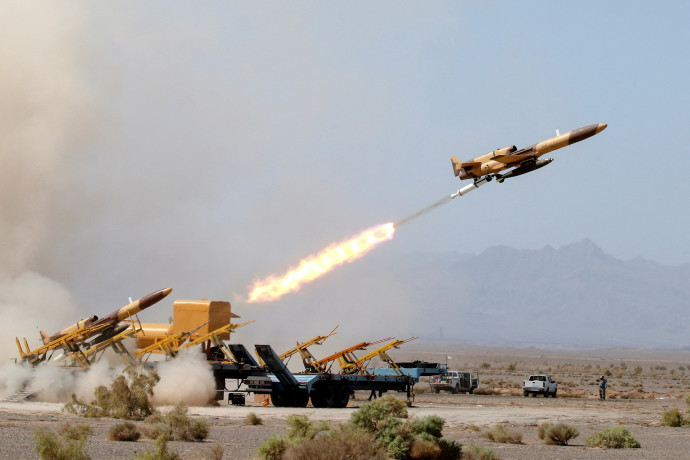Israel does not have a credible military threat that can destroy Iran’s entire nuclear program, but it still can do it in other ways, according to former prime minister Ehud Olmert.
“There is no serious military strategy that can destroy all the nuclear reactors in Iran, but Israel can do it,” Olmert said at The Jerusalem Post Conference in New York on Monday.
The situation is different from other past nuclear threats, he explained.
“In Iraq in 1981, when Menachem Begin decided to attack the atomic reactor there, there was one reactor, and once it was destroyed, their plans were gone. When we attacked Syria, it was a lot more complex and difficult because they had over 300 long-range missiles aimed at every strategic point in Israel, and there were fears that they would attack if we did. It was a very complex, delicate and fragile situation. We finally succeeded in destroying it, and once we did Syria no longer had a nuclear plan,” he said.
“For Iran, it’s very different because there are so many reactors, some of them are underground,” he explained.

“The Iranians know why they still don’t have a nuclear bomb,” Olmert added. “It’s not because of their commitments, it’s because of what very smart and brave Israelis were doing many years ago, and that’s what we should be doing instead of making provocative statements and creating fear,” he said.
“If we do it this way, Iran will not have a nuclear reactor because of the resourcefulness and sophistication of the forces under the command of the Israeli government.”
Olmert criticized Israel's leadership for speaking too much about the issue.
“As a basic principle, I think on certain matters and certain on this, the less you talk publicly, the more you do is much better,” he said. “We never talked about it for all these years that we were in charge, and we did many things we didn’t talk about.”
Olmert was prime minister when Israel attacked Syria’s nuclear reactor in 2007, and famously stood up to then-US president George W. Bush.
“The president, in what turned out to be a very dramatic and famous telephone call, said the US is against an Israeli attack and the only option he supports is diplomatic effort. He [said he] will send [then-secretary of state] Condoleezza Rice to Israel to hold a big press conference that will shake the whole world into joining forces together to squeeze the Syrians to stop the preparations for the nuclear reactor. I immediately, without a second of waiting, said, ‘Mr. President, [if] you will not do it, I will do it, because responsibility for the defense of Israel is mine and not yours,’” he recalled.
Asked why no one seems to talk about the Israeli-Palestinian conflict anymore, Olmert said the reason had to do with Israel’s political turbulence.
“We don’t talk about the Palestinians, but do we talk about anything serious? We are cursing each other. We are facing a turbulent and unstable political situation. And I’m afraid not only are we going to the fifth round of elections in three years but that we’re going to the sixth round if there will not be a very decisive outcome,” he said.
"We don’t talk about the Palestinians, but do we talk about anything serious? We are cursing each other; we are facing a turbulent and unstable political situation. And I’m afraid not only are we going to the fifth round of elections in three years but that we’re going to the sixth round if there will not be a very decisive outcome."
former prime minister Ehud Olmert
Ignoring the Palestinians is a mistake
“One must understand something: We don’t need to talk to the Palestinians because we want to help them. We need to do it to help us. We need to separate from them because the continued entanglement between us and them is a recipe for continued confrontations, for pain and blood that we don’t want and they don’t need. By passing [up on] this, by ignoring this, we don’t help Israel. We will continue to deal with terror in the worst possible way,” he said.
Olmert refused to say whom he would support in the upcoming election, but expressed his belief in the makeup of the current coalition.
“I am very much in favor of having the current coalition, with some changes and differences, running the country for the next four years. I’m not going to say who I want in charge. [Prime Minister Yair] Lapid is a good guy. [Alternate Prime Minister Naftali] Bennett is a good guy. [Defense Minister Benny] Gantz is a good guy. There are many good guys. But they are better, more serious, more responsible and less divisive than the alternatives facing them. So I am in their favor,” he said.
However, Olmert advised, they need to show more grit.
“I expect them to show more determination,” he said, adding that he wanted “leaders where you can see something burning in their belly and in their chest, threatening to explode all over the place so they can achieve what they think is essential for the security and prosperity for the State of Israel.
“That was Begin. That was [former prime minister Yitzhak] Rabin. That was former [prime minister Yitzhak] Shamir. I fear there is not enough fire in the chest of some of these people, because we need the kind of leadership that will bring back unity and leadership.”